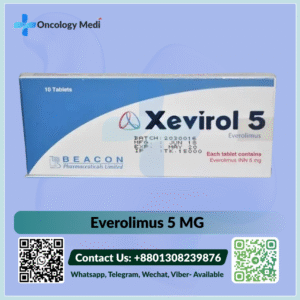Description
Peminib 13.5 mg, containing the active component Pemigatinib, is an oral drug that’s employed primarily in the treatment of some types of cholangiocarcinoma( corrosiveness conduit cancer) and other cancers associated with fibroblast growth factor receptor (FGFR) gene mutations. Pemigatinib belongs to a class of targeted cancer specifics known as kinase impediments, more specifically an FGFR asset. By blocking aberrant FGFR exertion, this drug reduces or stops the growth of cancer cells that use these pathways to gain.
Peminib is an important advance in perfection oncology and offers stopgap to individualities with advanced or metastatic cancers that aren’t amenable to conventional treatments. It’s taken in tablet form orally, allowing cases to continue treatment accessibly at home under a doctor’s supervision.
Composition and Form
Every Peminib 13.5 mg tablet has Pemigatinib as its active component. The tablets also contain inactive constituents (excipients) that stabilize the expression and insure applicable immersion of the medicine.
Peminib 13.5 mg tablets are generally available in fester packs for diurnal or cyclical dosing, as recommended by an oncologist.
Mechanism of Action
Pemigatinib, the active substance of Peminib, works by the picky inhibition of fibroblast growth factor receptors (FGFR1, FGFR2, and FGFR3). These receptors are involved in the regulation of cell growth, isolation, and survival.
In certain cancers, the FGFR genes may come abnormally actuated or fused with other genes, causing willful growth of cancer cells. By inhibiting these receptors, Pemigatinib disrupts the signaling pathways responsible for excrescence growth and angiogenesis (the conformation of new blood vessels to feed excrescences). This targeted action shrinks or halts the growth of cancer and can drop the size of excrescences in a subset of cases.
Therapeutic Uses
Peminib 13.5 mg is used and indicated to treat:
Cholangiocarcinoma (corrosiveness conduit cancer)
It’s indicated in grown-ups with locally advanced or metastatic cholangiocarcinoma with FGFR2 gene mixtures or rearrangements, as detected by an approved inheritable test.
It’s generally given after progression of the complaint on previous treatment with chemotherapy.
Other implicit suggestions (under disquisition)
Certain types of bladder cancer( urothelial melanoma) and myeloproliferative tumors containing FGFR gene differences.
Clinical trials are ongoing to determine the expanded operations of Pemigatinib in cancers carrying FGFR- driven mutations.
Dosage and Administration
The lozenge of Peminib is grounded on the case’s condition and treatment response.
The recommended cure for an grown-up is 13.5 mg by mouth formerly daily for 14 days continuously, followed by 7 days off treatment (21-day cycle).
The drug should be swallowed whole with water and not masticated or crushed.
It can be taken with or without food, but cases must take it at about the same time every day for harmonious blood situations.
Treatment continues until complaint progression or inferior toxin, whichever the oncologist determines.
Still, it should be taken as soon as flashed back unless it’s near than 4 hours to the coming listed dosing time, if a dose is missed. In that case, the missed dose should be skipped. Cases shouldn’t take a double cure to make up for a missed cure.
Possible Side Effects
Like all cancer specifics, Peminib 13.5 mg may beget side effects. Some are mild and respectable, while others bear cure adaptation or probative treatment.
Common side effects include
Sore mouth or mouth blisters
Fatigue or weakness
Nail or hair changes
Sore eyes or blurred vision
Constipation or diarrhea
Nausea and puking
Loss of appetite
Abdominal pain
Muscle or joint pain
Severe side effects (bear medical attention)
Hyperphosphatemia (high blood phosphate) is a common action that may beget muscle cramps or confusion.
Eye problems similar as serous retinal detachment; regular eye tests are recommend.
Nail and skin changes: Cracks, thickening, or color changes.
Electrolyte imbalance. Regular blood tests to cover for phosphate and calcium situations are need.
Life-threatening infections: Report any fever, sore throat, or coughing urgently.
Side goods are generally managed by oncolgists using probative curatives, cure interruption, or cure reduction.
Precautions and Warnings
The case should bandy their complete medical history with their doctor before taking Peminib 13.5 mg. Significant preventives are:
Gestation and lactation. Pemigatinib is dangerous to the future baby; effective contraception should be use during and for at least one week after the last dose. Breastfeeding should be avoid during and for one week after remedy.
Eye care: Regular ophthalmologic monitoring is need for early identification of vision-related side effects.
Phosphate control. The case may need a low-phosphate diet or phosphate binders if the position increases.
Order or liver impairment. Cure adaptations may be need in cases with disabled organ function.
Medicine relations Other specifics (e.g., strong CYP3A impediments or corrupters ) may alter the effectiveness of Pemigatinib or increase side effects.
Cases should always inform the doctor of all other specifics, supplements, or herbal products they’re using.
Storage
Store Peminib 13.5 mg tablets at room temperature (below 30 °C).
In the original packaging, down from humidity and direct sun.
Keep out of children’s reach.
Clinical Benefits
Clinical studies have revealed that Pemigatinib offers considerable advantages to cases who have FGFR2- altered cancers, as follows:
Loss of the excrescence (objective response rate). The excrescence size reduces in multitudinous cases.
Durable response Responses can last for months or indeed times.
enhancement in quality of life Oral remedy allows accessible home treatment compared to sanitarium- grounded chemotherapy.
These findings render Peminib a precious treatment option for cases who have exhausted traditional curatives.
Conclusion
Peminib 13.5 mg (Pemigatinib) represents a new advance in personalized cancer remedy. It offers picky and successful treatment of advanced cholangiocarcinoma and maybe other FGFR- driven malice by hindering specific inheritable differences. Under careful observation and medical care, Peminib offers new stopgap for cases to manage the complaint and enhance life expectation.
Still, since it’s a potent cancer drug, Peminib must only be take under strict monitoring by an oncologist who has experience with FGFR- target treatment. Regular follow-up, laboratory tests, and eye examinations are need for both effective and safe application.







Reviews
There are no reviews yet.